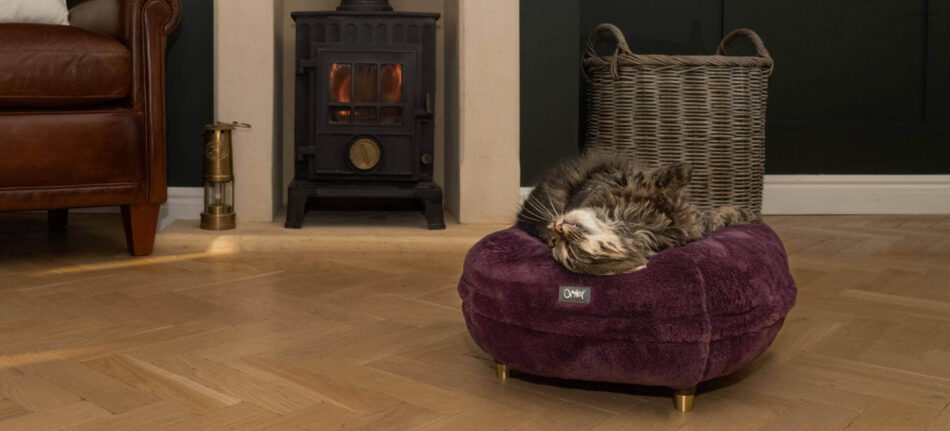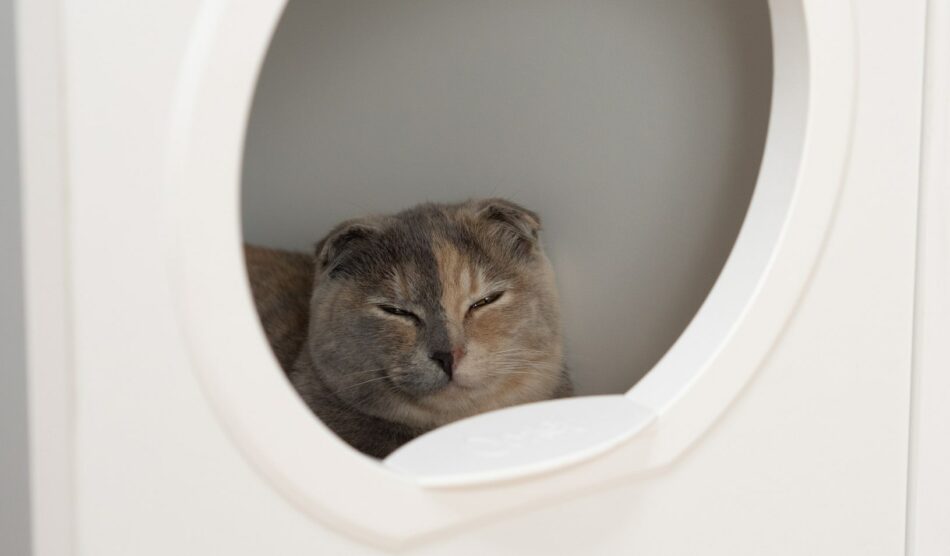How much do cats sleep?
When it comes to sleep, cats are the experts in this field. Often with the ability to sleep anywhere and in any position, cats are known for their love of slumber. But why do cats sleep so much? And how many hours of sleep a day do they really need? We have uncovered all the information you need to better understand your feline’s forty winks and why they may just have the paw on the pulse of pertinent sleep.
Why do cats sleep so much?
When it comes to sleep with any animal, two-legged or four-legged, there are a variety of different explanations for why so much sleep is needed. For cats, the best way to understand their sleep is to understand their biology.
By nature, cats are predators and are hard-wired as stalkers of prey. In order to quickly pounce and catch their food, they require quick bursts of energy to react. As a result, their bodies naturally seek quick, and often short, bursts of sleep to recharge.
While most felines spend the majority of their day in a snoozy state, only 25% of that time is actual deep sleep. The other 75% of the time they are in just a lightly rested state, or what we refer to as a “cat nap”. How can you tell which sleep state your cat is in? Next time your furry friend is snoozing on their super dreamy Maya Donut cat bed, check for any twitching of their ears. If you see movement, that means they’re likely in a rested, but not deep sleep. You can take a cat out of the wild, but you cannot take the wild instinct out of the cat.
So while cats may seem to sleep a lot, they usually never get it all in one stretch. Instead, they naturally opt for short 30-100 minute snooze breaks where they can rest their mind and bodies until the next burst of energy.
How many hours do cats sleep?
On average, most adult cats will sleep anywhere from 13-16 hours a day, with some only catching 10 hours of zzzs and others logging a total of 20 hours. While age, health, and disposition are key factors in a cat’s sleep habits, any cat owner will tell you that most cats sleep throughout the day. And often the night, too.
Kitten sleep
As tiny feline furballs, kittens average more sleep than the average adult cat. Why so much slumber? Kittens, like babies, are growing and learning at an exponential rate in their early stages of life. With such a rapid intake of information, sleep is an essential part of their development to process and grow. On average, most kittens can sleep 16-20 hours a day and this is completely normal. Just know that with every kitty cat nap, a frenzy of furball play will follow.
Adult cat sleep
By the time your kitten has reached maturity, which is usually around 18 months, they will have established a more regular sleep schedule. Most adult cats can sleep anywhere between 12-20 hours a day with short and abbreviated naps all day long. In the wild, cats tend to sleep all day and hunt all night. However, as man has domesticated our furry felines, they have adapted and learned to adopt new sleep patterns. So while you may still have a cat that likes to play at night, most adult cats will split their sleeping equally between day and night.
Senior cats
Just like humans, as cats get older, their sleep tends to get longer. Their bodies and metabolism slow down, requiring less outbursts of energy. Depending on breed, older cats are considered “senior” when they reach about 12-14 years of age. By this stage in their life, they may be logging up to 20 hours of sleep in a 24-hour period. This is completely normal. If, however, you do notice your senior cat’s sleep behaviours – like discomfort or unusual movement while sleeping – change, then consult with your veterinarian to make sure there is nothing else going on.
Which cat breeds like to sleep the most?
If you are looking for a lazy lap lounger to binge Netflix with you all day, you’re in luck. While all cats like to sleep, there are some that relish in the sweetness of slumber more than others. Let’s take a look at which cat breeds like to sleep the most:
Ragdoll: If given the chance to play with catnip or relax into a cat nap, the Ragdoll cat breed would choose the latter every time. This easy-going professional napper is also super affectionate and can fall asleep in any position. In fact, they have been known to ‘go limp’ in your arms when you pick them up, hence how they received their name.
Maine Coon: Known as the “gentle giant”, Maine Coon cats are the ultimate cuddling cat companions. Despite being large and long, this breed loves a snuggle session better than most and is happy to keep you warm on your couch both day and night.
Persian: What has long hair and could sleep all day long? Persians. If sleeping were an Olympic sport, the Persian would win gold. This breed is known as the relaxation expert so if you are seeking a sleeping companion, look no further than the Persian.
Just remember that with these cat breeds, because they prefer sleep more than most, that having lots of playtimes and cat toys is essential. Yes, sleep is beneficial for their health, but too much of any one thing isn’t good, so be sure to keep them active when awake.
Impacts on a cat’s sleep and how to encourage better habits
Most domesticated animals will start to adopt the sleep/awake patterns of their owners over time. Cats are no exception. While they do sleep more than humans on any given day, they can be just as affected by external influences as we are. We have compiled a list of some factors that could impact your cat’s sleep and offered some ways to encourage a better sleeping environment.
The right cat bed
When it comes to finding a bed for your cat, choosing something they’d rather rest on than your own bed can seem like a mission impossible. An uncomfortable, unsupportive bed is a recipe for a restless night for both you and your cat who decides to curl up on your covers instead. This is where the Omlet product designers step in. Meet the Maya Donut cat bed – a cat bed so luxurious it feels like a warm hug with every snooze. With a supportive shape and deep filling, the bed provides first-class comfort for cats, with a calming effect for anxious felines. Made with a faux fur material, the super soft feel of the bed is irresistible for any four-legged friend. Plus, you’ll sleep easy too, knowing that your cat is nestled up in the bed of their dreams.
Light
Whether artificial or natural, too much light for a cat can be a bad thing. In the wild, cats will seek out covered den-like areas to catch some quick zzzs. That innate trait stays with them, even in domestication. So having a darker sleeping environment is crucial to your cat’s sleep.
Just like we humans can’t sleep with all the lights on or when the sun is at high noon, neither can our feline friends. So try and create a room or space in your house that your cat can retreat to in order to get their beloved slumber. The Omlet Maya indoor cat house is the perfect option as it provides your cat with the secluded sanctuary they desire. Plus, the Maya Donut cat bed fits in perfectly with the cat house, creating the perfect cozy getaway space.
Active owners
Monkey see, monkey do! Or in the case of your cats, feline see, feline do! Even though cats are solitary animals who can easily enjoy a solo life, they usually can’t help but be impacted by the lifestyle of their respective owners. Especially in the last few years as people have rearranged their work habits to include more time spent at home, this impact is felt fully by your feline friends.
Most cats can sleep anywhere, at any time. However, if you, their owner, are constantly moving about the house and making disruptive noises, your cat’s sleep will be impacted. So while you may not be able to change your habits, you can help adjust your cats by giving them more spots and places to seek solitude. Consider the Freestyle Indoor Cat Tree where you can customize the ultimate “active to sleep retreat” for your cat.
Change in diet
Have you ever had a big greasy meal for dinner only to find yourself in a restless night’s sleep later? Cats can feel the same way whenever their food is changed or adjusted. When we start to feel lazy or like we may be putting on some extra weight, we have a tendency to reduce the amount of food we eat. And all too often, pet parents will make the same mistake with their cats. They think that because their cat is sleeping all day, it certainly can’t be burning off all the food it ate. So perhaps a reduction in their amount of food is the right idea? Wrong!
A quick reduction in your cat’s food intake will quickly result in a negative impact on their sleep. Before making any changes to your cat’s diet, always first consult with your veterinarian. And no matter how much you feed them, make sure your cat has a clean and sturdy cat food bowl to eat and drink from.
Omlet and your cat’s sleep
Omlet knows the importance of a cat’s sleep, which is why we made products like the Maya Donut cat bed and Maya Indoor cat house. So, next time your cat is sprawled out on the sofa in yet another siesta, try to appreciate their ease of life. Grab a blanket, curl up next to them and enjoy a quick cat nap.
This entry was posted in Cats

